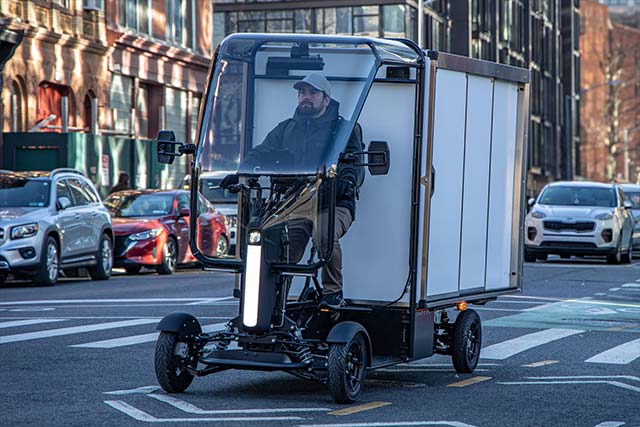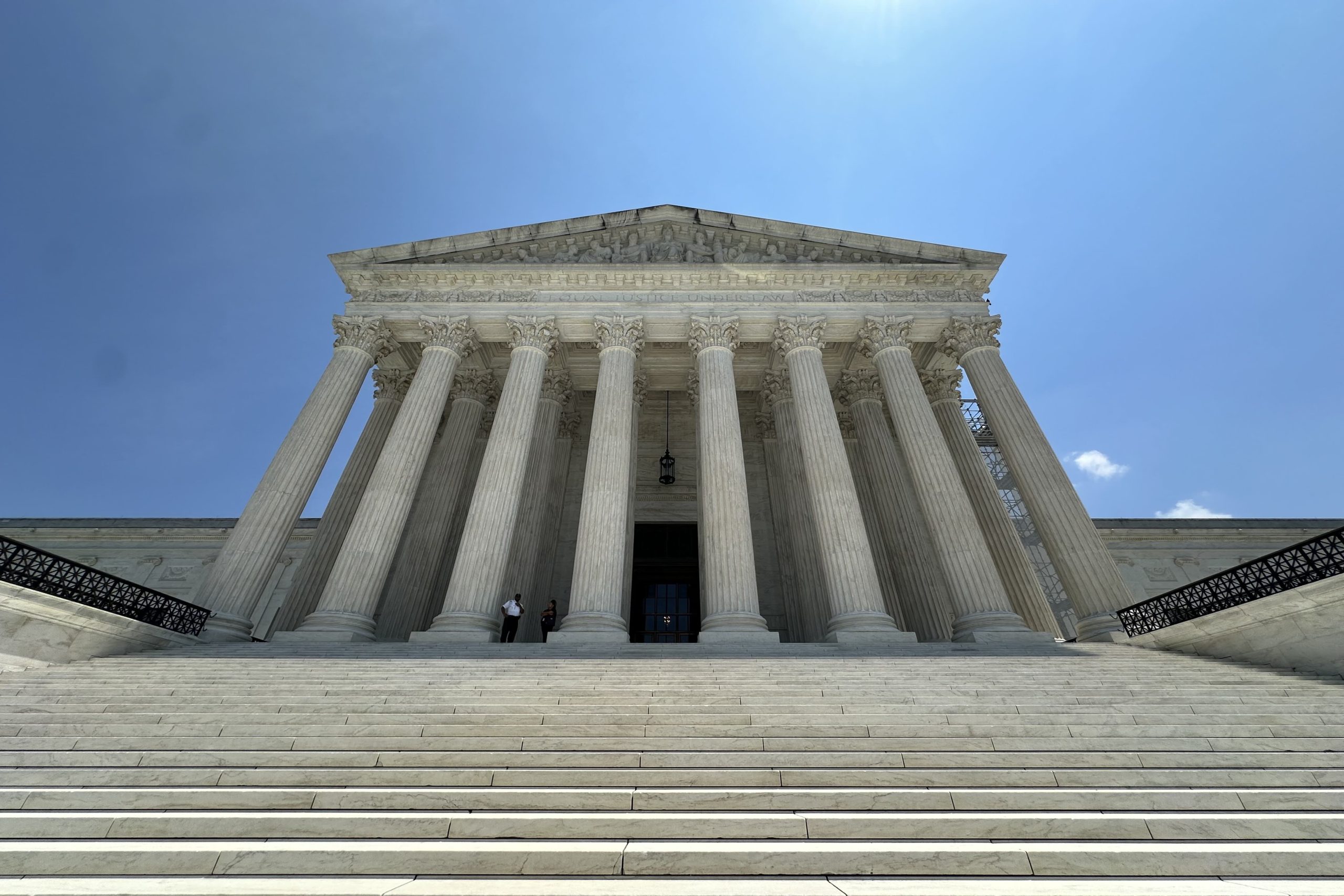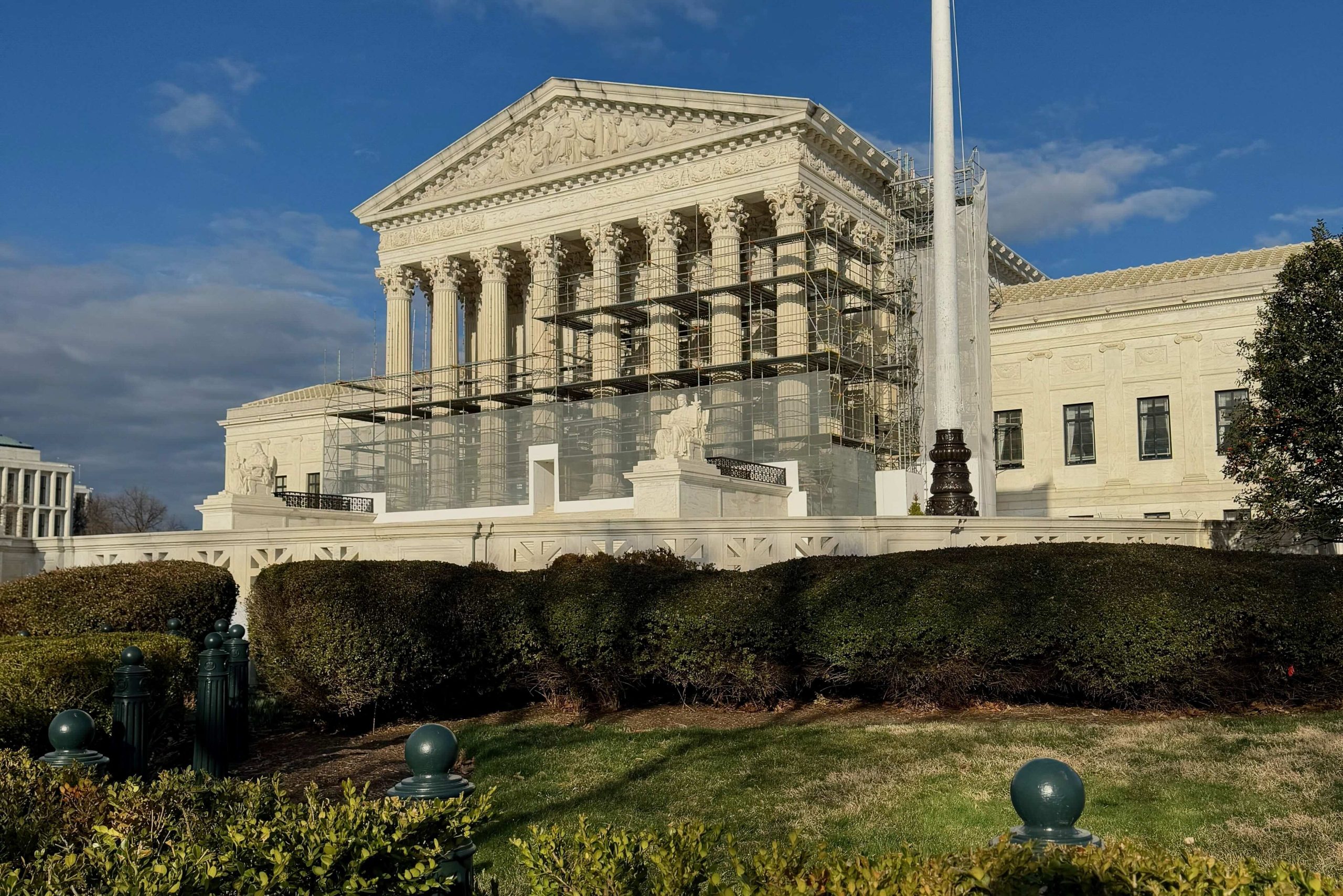Trump asks high court to allow DOGE access to Social Security records
The Trump administration came to the Supreme Court on Friday afternoon, asking the justices to pause a preliminary injunction issued by a federal judge in Maryland that temporarily bars members of the so-called Department of Government Efficiency from accessing the records of the Social Security Administration. The order by Senior U.S. District Judge Ellen Lipton Hollander, U.S. Solicitor General D. John Sauer wrote, “does not merely halt the Executive Branch’s critically important efforts to improve its information-technology infrastructure and waste,” but “also constitutes inappropriate superintendence of a coequal branch.” President Donald Trump formed DOGE, which is not a cabinet-level department, through an executive order that he signed on the first day of his second term in office. In February, two labor unions and a grassroots advocacy group, the Alliance for Retired Americans, went to federal court in Baltimore, Md., to challenge SSA’s decision to provide DOGE with access to its records. They contended that SSA had “abandoned its commitment to maintaining the privacy of personal data” for millions of Americans. In March, Hollander temporarily barred SSA from giving DOGE team members access to SSA records, and in April it extended that prohibition while litigation continued in the lower courts. By a vote of 9-6, the full U.S. Court of Appeals for the 4th Circuit turned down the government’s request to put Hollander’s order on hold. That prompted the government to come to the Supreme Court on Friday afternoon, asking the justices to intervene. Sauer argued first that the challengers in this case do not have a legal right to sue, known as standing, because they cannot show that their members have actually been injured by the actions that they seek to stop. Although they contend that “the disclosure of their personal information to SSA DOGE team members constitutes an invasion of their privacy,” he wrote, they do not allege that their personal information has been revealed to anyone outside the government. Indeed, he noted, everyone who works at SSA – including DOGE team members – “are bound by the same legal and ethical restrictions on the disclosure” of personal information. Moreover, Sauer added, the challengers’ members voluntarily gave their information to the SSA, knowing that it “would routinely be used by agency employees and others within and outside the government to perform the types of activities that the SSA DOGE team members plan to undertake.” Sauer next contended that Hollander did not have the power to review the challengers’ claim because an agency’s decision about “which employees may access particular agency data” is not the kind of final agency action that courts can review under the federal law governing administrative agencies. If it were, he told the justices, such a definition “would have sweeping and untenable consequences,” opening the door for federal courts to review “virtually every aspect of an agency’s internal management of its employees.” Sauer urged the justices to intervene, telling them that Hollander’s order “imposes a significant obstacle to executing one of the President’s chief policy initiatives.” By contrast, he noted, there is no permanent harm to the challengers if the order is put on hold. In fact, he emphasized, the 4th Circuit granted the government’s request to put on hold another order by a district court in Maryland barring disclosure of some records to DOGE members by the Departments of the Treasury and Education, as well as the Office of Personnel Management. Sauer also asked the court to issue an administrative stay – that is, to temporarily pause Hollander’s order to give it time to consider the government’s request. “The district court’s flawed injunction,” he concluded, “forecloses the Executive Branch from carrying out the pressing priorities of modernizing government information systems and ferreting out fraud, waste, and abuse.” The district court, he continued, “has now blocked these time-sensitive efforts for over a month, without any legal basis for doing so.” The court on Friday afternoon directed the challengers to file their response by 4 p.m. on Monday, May 12. It did not act (at least immediately) on Sauer’s request for an administrative stay. The post Trump asks high court to allow DOGE access to Social Security records appeared first on SCOTUSblog.
The Trump administration came to the Supreme Court on Friday afternoon, asking the justices to pause a preliminary injunction issued by a federal judge in Maryland that temporarily bars members of the so-called Department of Government Efficiency from accessing the records of the Social Security Administration. The order by Senior U.S. District Judge Ellen Lipton Hollander, U.S. Solicitor General D. John Sauer wrote, “does not merely halt the Executive Branch’s critically important efforts to improve its information-technology infrastructure and waste,” but “also constitutes inappropriate superintendence of a coequal branch.”
President Donald Trump formed DOGE, which is not a cabinet-level department, through an executive order that he signed on the first day of his second term in office. In February, two labor unions and a grassroots advocacy group, the Alliance for Retired Americans, went to federal court in Baltimore, Md., to challenge SSA’s decision to provide DOGE with access to its records. They contended that SSA had “abandoned its commitment to maintaining the privacy of personal data” for millions of Americans.
In March, Hollander temporarily barred SSA from giving DOGE team members access to SSA records, and in April it extended that prohibition while litigation continued in the lower courts.
By a vote of 9-6, the full U.S. Court of Appeals for the 4th Circuit turned down the government’s request to put Hollander’s order on hold. That prompted the government to come to the Supreme Court on Friday afternoon, asking the justices to intervene.
Sauer argued first that the challengers in this case do not have a legal right to sue, known as standing, because they cannot show that their members have actually been injured by the actions that they seek to stop. Although they contend that “the disclosure of their personal information to SSA DOGE team members constitutes an invasion of their privacy,” he wrote, they do not allege that their personal information has been revealed to anyone outside the government. Indeed, he noted, everyone who works at SSA – including DOGE team members – “are bound by the same legal and ethical restrictions on the disclosure” of personal information. Moreover, Sauer added, the challengers’ members voluntarily gave their information to the SSA, knowing that it “would routinely be used by agency employees and others within and outside the government to perform the types of activities that the SSA DOGE team members plan to undertake.”
Sauer next contended that Hollander did not have the power to review the challengers’ claim because an agency’s decision about “which employees may access particular agency data” is not the kind of final agency action that courts can review under the federal law governing administrative agencies. If it were, he told the justices, such a definition “would have sweeping and untenable consequences,” opening the door for federal courts to review “virtually every aspect of an agency’s internal management of its employees.”
Sauer urged the justices to intervene, telling them that Hollander’s order “imposes a significant obstacle to executing one of the President’s chief policy initiatives.” By contrast, he noted, there is no permanent harm to the challengers if the order is put on hold. In fact, he emphasized, the 4th Circuit granted the government’s request to put on hold another order by a district court in Maryland barring disclosure of some records to DOGE members by the Departments of the Treasury and Education, as well as the Office of Personnel Management.
Sauer also asked the court to issue an administrative stay – that is, to temporarily pause Hollander’s order to give it time to consider the government’s request. “The district court’s flawed injunction,” he concluded, “forecloses the Executive Branch from carrying out the pressing priorities of modernizing government information systems and ferreting out fraud, waste, and abuse.” The district court, he continued, “has now blocked these time-sensitive efforts for over a month, without any legal basis for doing so.”
The court on Friday afternoon directed the challengers to file their response by 4 p.m. on Monday, May 12. It did not act (at least immediately) on Sauer’s request for an administrative stay.
The post Trump asks high court to allow DOGE access to Social Security records appeared first on SCOTUSblog.



























































































![The American contingent and Turkey’s autonomy goals: Paris Air Show Day 3 [Video]](https://breakingdefense.com/wp-content/uploads/sites/3/2025/06/Wednesday-Wrap.00_00_32_21.Still001.png?#)
![A look at the jets flying high above the Paris Air Show [PHOTOS]](https://breakingdefense.com/wp-content/uploads/sites/3/2025/06/Rafale_02-scaled-e1750268097167.jpg?#)
























































